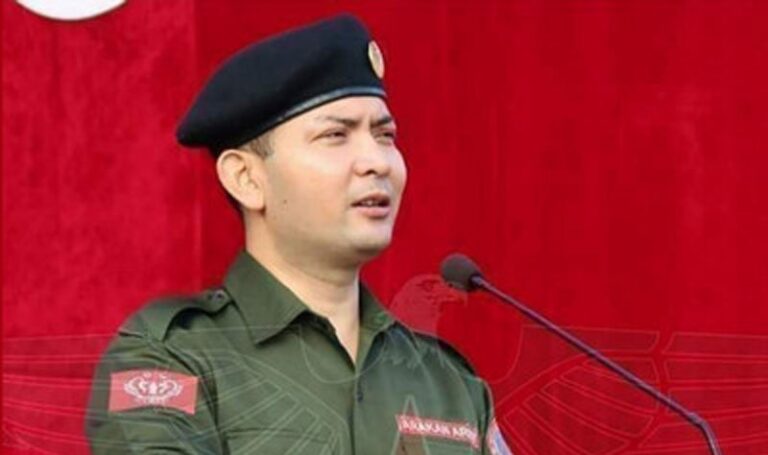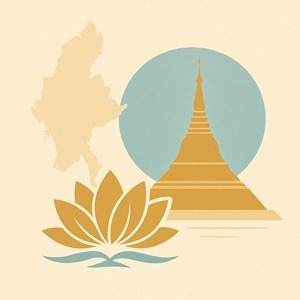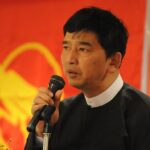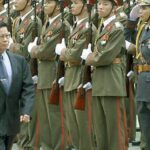
Major General Twan Mrat Naing – Commander of the Arakan Army
Major General Twan Mrat Naing (Burmese: ထွန်းမြတ်နိုင်), born on November 7, 1978, in Sittwe, Rakhine State, is the Commander-in-Chief of the Arakan Army (AA) and the Chairman of its political wing, the United League of Arakan (ULA). He has become one of the most influential ethnic leaders in Myanmar, known for shaping Rakhine’s political identity and leading an armed movement for autonomy since founding the AA in 2009.
🛡️ Early Life and Formation of the Arakan Army
Before entering military life, Twan Mrat Naing worked as a tour guide in Yangon, where he learned English and gained a broad understanding of global affairs. This experience exposed him to foreign perspectives on freedom and governance, ideas that would later influence his political vision.
In 2004, he met Dr. Nyo Twan Awng, a physician who shared his nationalist aspirations. Together, they began organizing what would become the Arakan Army, officially founded in 2009 with early support from the Kachin Independence Army (KIA) in northern Myanmar.
The AA began with just 26 members, operating in remote border regions. Over time, it grew into one of the most powerful ethnic armed forces in Myanmar. The organization’s main goal was to secure self-determination and equal rights for the Rakhine people, who had long felt neglected by the central government.
⚔️ Rise in Military Power and Strategic Leadership
Under Twan Mrat Naing’s leadership, the Arakan Army developed into a highly organized and disciplined military force. His command style combined modern strategy with deep knowledge of local terrain and ethnic dynamics.
By 2024, the AA reportedly controlled nearly 90% of Rakhine State, including strategic areas such as Maungdaw, Mrauk-U, Kyauktaw, and Ann. Twan Mrat Naing’s approach relied on three main pillars:
Recruitment and Training – Mobilizing local youth frustrated by poverty and injustice, while emphasizing loyalty, discipline, and nationalism.
Civil Administration – Building parallel governance systems that manage health, education, and local law enforcement in areas under AA control.
Modern Warfare Tactics – Using drones, guerrilla strategies, and intelligence coordination to challenge the Myanmar military effectively.
These measures turned the AA into one of the most capable ethnic armies in the country. As a result, Twan Mrat Naing became both a military strategist and a symbol of Rakhine resistance.
🏛️ Political Ideology and the United League of Arakan
As Chairman of the United League of Arakan (ULA), Twan Mrat Naing’s political beliefs focus on federalism and self-governance. He envisions a federal democratic union in which all ethnic nationalities share equal rights and responsibilities.
His ideology can be summarized in three key themes:
Arakanese Nationalism – Preserving the history, language, and traditions of the Rakhine people.
Self-Determination – Empowering Rakhine citizens to manage their own political and economic affairs.
Confederal Unity – Supporting a system that allows ethnic states to cooperate within a broader Myanmar federation.
Twan Mrat Naing has also strengthened alliances with other ethnic armed groups. He co-founded the Three Brotherhood Alliance, alongside the Ta’ang National Liberation Army (TNLA) and the Myanmar National Democratic Alliance Army (MNDAA). This coalition has become a central force in Myanmar’s civil war, jointly coordinating military operations against the junta.
🤝 Diplomacy and International Relations
Although often portrayed as a rebel leader, Twan Mrat Naing has shown diplomatic skill. He has participated in several peace negotiations and publicly called for international recognition of ethnic struggles in Myanmar.
He frequently uses social media to express his views on autonomy, human rights, and federal democracy. However, his rhetoric is sometimes controversial, reflecting the tension between nationalist ideals and humanitarian concerns.
👨👩👧👦 Personal Life and Family Challenges
Twan Mrat Naing is married to Hnin Zar Phyu, and the couple has two children. His family has often faced political persecution due to his leadership role.
In 2019, several relatives were detained in Myanmar and Singapore over alleged connections to the Arakan Army. That same year, his wife and children were arrested in Thailand, later relocating to Switzerland under UNHCR protection.
These personal hardships highlight the risks faced by families of Myanmar’s ethnic leaders. Despite such challenges, Twan Mrat Naing has continued to lead both the military and political wings of the Arakan movement.
⚠️ Controversies and Human Rights Allegations
Twan Mrat Naing’s leadership is not without controversy. He has been criticized for his harsh remarks toward the Rohingya community, sparking debate about ethnic inclusivity within Rakhine politics.
In August 2024, the Arakan Army was accused of involvement in a massacre in Maungdaw, which reportedly killed more than 150 Rohingya civilians. International human rights organizations, including Amnesty International and Human Rights Watch, have called for an independent investigation.
While the AA has denied responsibility, the incident damaged its international image and raised questions about its long-term political goals.
🌏 Legacy and Influence
Despite controversy, Twan Mrat Naing remains one of Myanmar’s most influential ethnic leaders. His combination of military strategy, administrative planning, and nationalist vision has made him a dominant figure in western Myanmar.
Supporters see him as a defender of Rakhine pride, a man who turned a small rebel group into a major political force. Critics, however, warn that his methods and ideology could deepen ethnic divisions.
As Myanmar’s civil war continues, Twan Mrat Naing’s future role will likely shape the country’s path toward — or away from — a genuine federal democracy.
🕊️ Conclusion
Major General Twan Mrat Naing’s story reflects the complex reality of Myanmar’s ethnic politics — a mix of nationalism, military struggle, and the pursuit of equality. Whether seen as a revolutionary or a polarizing figure, his leadership continues to redefine the power dynamics in Rakhine State and across Myanmar.
FAQ: Major General Twan Mrat Naing
Who is Twan Mrat Naing?
Twan Mrat Naing is the Commander-in-Chief of the Arakan Army (AA), an ethnic Rakhine armed organization operating primarily in Rakhine and Chin States, Myanmar. He is a key figure in Myanmar’s ongoing civil conflict, advocating for greater political autonomy and rights for the Rakhine people.
When and where was Twan Mrat Naing born?
He was born in Sittwe (formerly Akyab), the capital of Rakhine State, Myanmar. While his exact birth date is not publicly confirmed, he is believed to have been born in the late 1970s or early 1980s.
What is the Arakan Army (AA)?
The Arakan Army was founded in 2009 by Twan Mrat Naing and Dr. Nyo Twan Awng. It is one of Myanmar’s most powerful ethnic armed groups, aiming to achieve self-determination, equality, and justice for the Rakhine (Arakanese) people. The group operates under the broader umbrella of the Three Brotherhood Alliance alongside the Ta’ang National Liberation Army (TNLA) and the Myanmar National Democratic Alliance Army (MNDAA).
What are Twan Mrat Naing’s main goals?
His stated goals include:
Establishing political autonomy and equal rights for the Rakhine people.
Ensuring control over natural resources within Rakhine State.
Ending decades of military oppression under Myanmar’s central government.
Promoting ethnic unity and federal democracy in Myanmar.
What role does he play in Myanmar’s current civil war?
Since the February 2021 military coup, the Arakan Army under Twan Mrat Naing has expanded its influence significantly. The group controls large parts of northern Rakhine and parts of Chin State, maintaining its own administrative and judicial systems in those areas. Twan Mrat Naing has been a key figure in coordinating offensives against the Myanmar military, often alongside allied groups.
Is Twan Mrat Naing part of the National Unity Government (NUG)?
No. The Arakan Army is not officially part of the National Unity Government, which was formed by ousted civilian leaders and pro-democracy forces. However, the AA has occasionally cooperated with anti-junta forces and shares common goals in weakening the Myanmar military regime.
What are his political views?
Twan Mrat Naing emphasizes federalism, ethnic equality, and self-governance. He often criticizes Myanmar’s centralized system and advocates for a federal democratic union that recognizes the rights of all ethnic nationalities.
Has he made any international statements?
Yes. Twan Mrat Naing has given several interviews to international media outlets such as The Irrawaddy, Frontier Myanmar, and RFA (Radio Free Asia). He has called on the international community to understand the Rakhine cause and to recognize that Myanmar’s ethnic struggles are rooted in decades of political exclusion.
Why is Twan Mrat Naing considered influential?
He is widely regarded as one of the most strategic ethnic leaders in Myanmar’s modern history. Under his command, the Arakan Army evolved from a small guerrilla unit into a powerful political and military force. His leadership combines strong organizational control, public communication skills, and grassroots support from Rakhine civilians.
Has Twan Mrat Naing faced international sanctions?
As of 2025, Twan Mrat Naing has not been individually sanctioned by major international bodies such as the United States, European Union, or United Nations. However, the Myanmar military junta often labels him and the Arakan Army as insurgents and “terrorists.”
What is the relationship between the Arakan Army and the Myanmar military?
The relationship has fluctuated between ceasefire and conflict. Although temporary truces were declared in the past, large-scale fighting resumed in 2022 and 2023. Currently, the AA is one of the most active forces fighting against the junta in western Myanmar.
What are the humanitarian impacts of the conflict in Rakhine State?
The clashes between the Arakan Army and Myanmar military have led to civilian displacement, human rights abuses, and restricted humanitarian access. Despite these hardships, many locals view the AA as protectors of Rakhine interests.
How is Twan Mrat Naing perceived among the Rakhine people?
He is often admired as a defender of Rakhine nationalism and self-determination. Supporters see him as a disciplined and visionary leader, while critics accuse him of militarizing ethnic politics.
Does Twan Mrat Naing engage in diplomacy or peace talks?
Yes. He has participated in peace talks and dialogues mediated by organizations such as the Nationwide Ceasefire Agreement (NCA) framework. However, most of these efforts stalled after the 2021 coup, as ethnic groups lost faith in the central government’s willingness to negotiate genuinely.
What is the future outlook for Twan Mrat Naing and the Arakan Army?
The AA continues to strengthen its military and administrative control in Rakhine State. Analysts predict that under Twan Mrat Naing’s leadership, the AA could become a decisive political force in shaping Myanmar’s post-junta federal structure—if the civil conflict evolves into negotiated governance.



